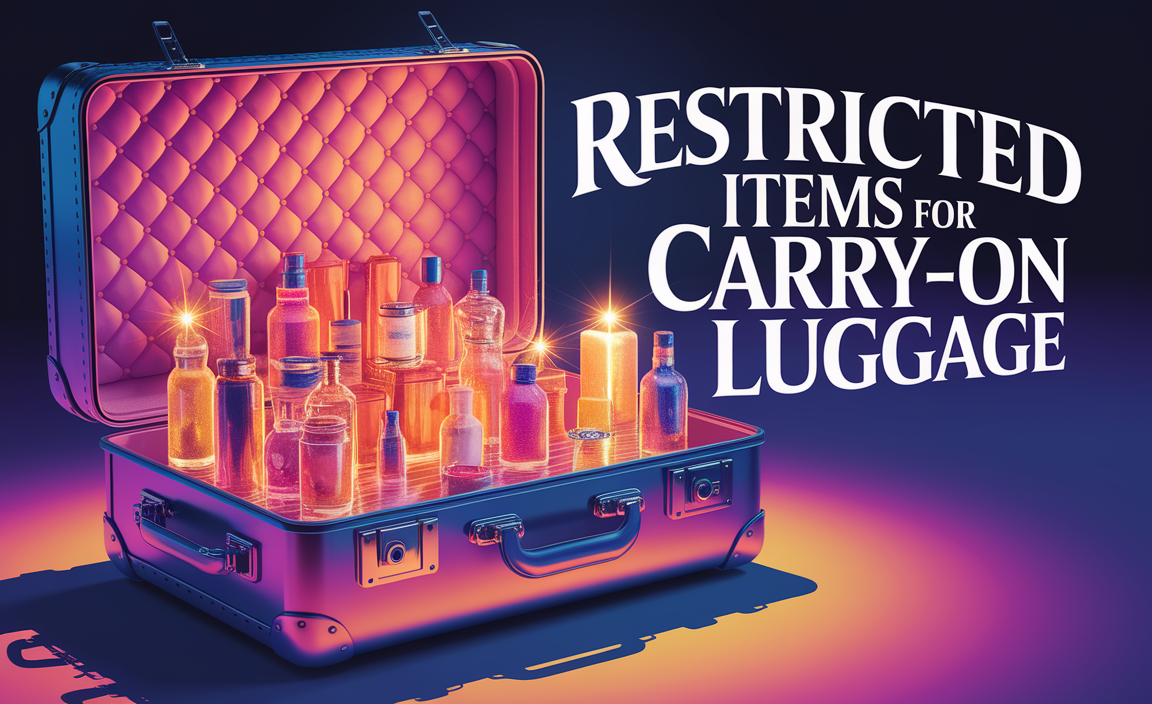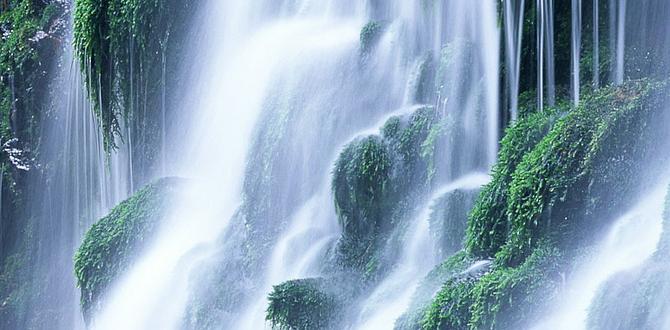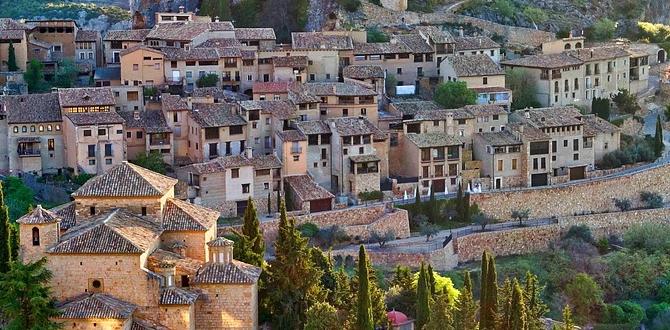Plan your Algeria shoulder season trip for fewer crowds, pleasant weather, and better prices. This guide offers essential tips for a stress-free adventure, covering everything from best times to visit to packing and local etiquette.
Dreaming of exploring Algeria but worried about the heat or the peak season rush? You’re in luck! Visiting Algeria during its shoulder seasons – spring and autumn – is a fantastic way to experience its magic without the hustle and bustle.
This means more space to enjoy ancient ruins, cooler temperatures for delightful city strolls, and potentially even some savings on your trip. It might seem a little daunting to plan for a less common travel time, but with a few smart tips, you can put together an amazing adventure. Let’s unlock the secrets to a perfectly planned Algeria shoulder season trip, focusing on comfort and enjoyment every step of the way.
Why Algeria in the Shoulder Season?
Algeria is a land of incredible diversity, from the vast Sahara Desert to the Roman ruins and vibrant coastal cities. While summer can be intensely hot, especially inland, and winter can bring chilly, rainy days in the north, the shoulder seasons offer a sweet spot. These periods typically fall between March to May (spring) and September to November (autumn).
Choosing these times means you can:
- Enjoy milder temperatures, perfect for exploring historical sites.
- Experience fewer tourists, leading to a more authentic and relaxed visit.
- Potentially find better deals on flights and accommodation.
- Witness beautiful natural scenery at its best, like blooming desert flowers in spring or stunning autumn colors in the mountain regions.
When Exactly Are Algeria’s Shoulder Seasons?
Let’s break down the ideal windows for your visit:
Spring (March – May)
Spring is a delightful time to visit Algeria. The weather starts to warm up after winter, making it pleasant for exploring cities like Algiers, Oran, and Constantine. The desert landscapes can also be quite beautiful, with some areas experiencing wildflowers blooming after the winter rains. Temperatures are generally comfortable, though it can still be a little cool in the northern coastal areas early in spring.
Autumn (September – November)
Autumn is often considered the prime shoulder season. The intense heat of summer begins to fade, and the weather becomes wonderfully mild and sunny. This is an excellent time for exploring the Roman ruins of Timgad and Djemila, hiking in the Aurès Mountains, or even venturing into the Sahara for a desert experience before it gets too cold at night. The coastal areas remain pleasant for enjoying the Mediterranean air.
Algeria Shoulder Season Weather: What to Expect
Understanding the weather is key to packing right and ensuring your comfort. Algeria’s climate varies significantly by region.
Northern Coastal Regions (Algiers, Oran, Annaba)
- Spring: Expect average daytime temperatures between 15°C and 25°C (59°F – 77°F). Evenings can be cooler, especially in March. There might be occasional rain showers.
- Autumn: Temperatures are typically between 20°C and 30°C (68°F – 86°F) in September and October, gradually cooling down in November. It’s usually sunny and dry, perfect for sightseeing.
Inland & Desert Regions (Sahara, Tamanrasset)
- Spring: Daytime temperatures can range from 20°C to 35°C (68°F – 95°F). Nights can still be cool, dropping to 10°C – 15°C (50°F – 59°F).
- Autumn: Daytime highs are often a pleasant 25°C to 35°C (77°F – 95°F), but desert nights will get significantly colder, potentially dropping below 10°C (50°F) by late autumn.
It’s always a good idea to check the specific forecast for your chosen destinations closer to your travel date. Resources like World Weather Online can offer detailed historical data and current forecasts to help you plan.
Crafting Your Algeria Shoulder Season Itinerary: Must-Visit Locations
The shoulder season is ideal for experiencing Algeria’s diverse attractions. Here are some recommendations:
Must-See Destinations and Activities:
- Algiers: Explore the Casbah (a UNESCO World Heritage site), stroll along the Corniche, visit the Notre-Dame d’Afrique basilica, and discover the Museum of Antiquities and Fine Arts. The milder weather makes it perfect for walking tours.
- Roman Ruins: Timgad and Djemila are spectacular and less crowded during these months. Imagine walking through history with ample space to yourselves.
- Sahara Desert: Autumn is particularly good for desert trips. Experience camel treks, stargazing under clear skies, and overnight stays in desert camps. Spring is also viable but can start getting quite warm in the afternoons.
- Constantine: Known as the “City of Bridges,” Constantine offers stunning views and a rich history. Explore its old town and the Sidi Messaoud gorge.
- Oran: Algeria’s second-largest city has a lively atmosphere, beautiful architecture (including the historic Kasbah), and great seafood.
- Tipasa: Another fascinating Roman archaeological site on the coast, offering beautiful sea views.
Planning Your Trip: Essential Steps
Successful travel, especially to a new destination, relies on solid planning. Here’s a step-by-step approach for your Algeria shoulder season adventure.
Step 1: Determine Your Exact Travel Dates
Decide whether you prefer the freshness of spring or the warmth of autumn. Consider major holidays in Algeria, as some attractions might have altered hours. Ramadan’s dates shift annually, and travel during this period can offer a unique cultural experience but also requires understanding local customs regarding eating and drinking during fasting hours.
Step 2: Book Flights and Accommodation
As soon as your dates are set, start looking for flights. Shoulder season can offer savings, but booking in advance is still the best strategy. For accommodation, you’ll find a range of options from modern hotels in cities to charming guesthouses and desert camps. Booking popular spots early ensures you get your preferred choice.
Step 3: Obtain Your Visa
Most nationalities require a visa to enter Algeria. Start this process well in advance, as it can take time. Requirements vary, so check the Algerian embassy or consulate website in your country for the most up-to-date information and application procedures. The Embassy of Algeria Worldwide directory is a good starting point to find your local representation.
Step 4: Plan Your Itinerary and Transportation
Outline the places you want to visit and how you’ll get around. Algeria is a large country! Domestic flights are efficient for covering long distances. Trains connect major cities in the north, offering scenic journeys. For flexibility, consider renting a car if you’re comfortable driving in Algeria, or hiring private drivers, especially for desert excursions.
Step 5: Pack Smart for Comfort and Versatility
Packing for Algeria’s shoulder season requires layering and versatility. What you pack will depend heavily on whether you’re focusing on the coast, inland cities, or the desert.
Essential Packing List:
- Clothing:
- Lightweight, breathable fabrics (cotton, linen)
- Long-sleeved shirts and long pants (for sun protection and cultural modesty)
- A comfortable sweater or fleece for cooler evenings
- A light to medium-weight jacket
- Scarf or pashmina (useful for women to cover their heads when visiting religious sites, and for everyone for warmth/sun protection)
- Comfortable walking shoes (essential for exploring ruins and cities)
- Sandals or flip-flops
- Accessories:
- Sunscreen (high SPF)
- Wide-brimmed hat
- Sunglasses
- Reusable water bottle
- Small backpack or daypack
- Travel adapter (Algeria uses Type C and Type F plugs)
- Portable power bank for electronics
- Health & Personal Care:
- Basic first-aid kit (band-aids, antiseptic wipes, pain relievers)
- Any personal medications
- Hand sanitizer
- For those who need them, discreet and comfortable adult diapers or pull-ups are essential for peace of mind on long travel days, especially on flights or extended bus tours. Packing sufficient supplies ensures you can focus on the experience without worry. Similarly, having child diapers readily available is crucial for parents traveling with young children, ensuring their comfort and a smoother journey for everyone.
Step 6: Familiarize Yourself with Local Customs and Etiquette
Algerian culture is largely rooted in Islam and Arab traditions. Dressing modestly is appreciated, especially outside major tourist hubs; this means covering shoulders and knees. It’s polite for men and women to avoid overly revealing clothing. Always ask permission before taking photos of people. Learning a few basic Arabic or French phrases like “Salam Alaikum” (peace be upon you) and “Shukran” (thank you) will be warmly received.
Budgeting for Your Algeria Shoulder Season Trip
Traveling in the shoulder season can be more budget-friendly. Here’s a rough breakdown of potential costs:
| Category | Estimated Cost (USD) – Per Person, Per Day (Mid-Range) | Notes |
|---|---|---|
| Accommodation | $40 – $80 | Hotels, guesthouses. Desert camps can vary. |
| Food | $20 – $40 | Mix of local eateries and restaurants. |
| Transportation (Local) | $15 – $30 | Taxis, local buses, or inter-city buses/trains. Domestic flights would add significantly. |
| Activities & Entrance Fees | $10 – $25 | Museums, historical sites. |
| Miscellaneous | $10 – $20 | Souvenirs, tips, etc. |
Note: This is a general estimate and does not include international flights, visa fees, or costs added by private tours or guides, especially for the Sahara. Flights and accommodation can be cheaper when booked in advance during shoulder seasons compared to peak times.
Ensuring Comfort for All Travelers
Comfort is crucial for enjoying any trip, and Algeria offers various ways to ensure a stress-free experience for different needs.
For Families with Children
Traveling with kids in Algeria can be rewarding. The milder weather in the shoulder seasons is ideal for exploring. Ensure you pack plenty of kid-friendly snacks. When it comes to managing needs, having an ample supply of child diapers is non-negotiable. Easy access to changing facilities might be sporadic, so a portable changing mat and a discreet bag for soiled diapers are lifesavers on excursions. Keep hydration levels high for little ones, especially when visiting drier regions.
For Adults Requiring Incontinence Support
Long travel days or visiting remote areas like the Sahara needn’t be a source of anxiety. Carrying adult diapers or pull-ups provides the security and discretion needed. Modern products are highly absorbent and comfortable, allowing you to participate fully in activities. Pack enough for your entire trip, plus a few extra, as sourcing specific brands in Algeria might be challenging. Discreet disposal bags are also important.
Focusing on these practical needs before you go means you can fully immerse yourself in the wonders of Algeria without worry.
Safety and Health Tips for Algeria
Algeria is generally a safe country for tourists, but like anywhere, it’s wise to be prepared.
- Stay Informed: Keep up-to-date with any travel advisories from your country’s government. For example, the U.S. Department of State provides country-specific information.
- Travel Insurance: Always purchase comprehensive travel insurance that covers medical emergencies, trip cancellations, and lost luggage.
- Food and Water: Stick to bottled water. Be cautious with street food and opt for well-cooked meals. Peel fruits and vegetables yourself.
- Scams: Be aware of common tourist scams, particularly in crowded areas. Trust your instincts and avoid overly friendly strangers offering unsolicited help.
- Driving: If you plan to drive, be aware that road conditions can vary, and local driving styles can be assertive.
Conclusion
Planning a trip to Algeria during the shoulder season is a smart choice for any traveler seeking a blend of comfort, affordability, and authentic experiences. By understanding the best times to go, preparing for the weather, and considering essential needs like comfort and personal care, you can ensure your journey is smooth and memorable.
From the ancient wonders of Roman cities to the breathtaking landscapes of the Sahara, Algeria offers an unforgettable adventure. With this guide, you’re well-equipped to step confidently into planning your own incredible Algerian escape. Embrace the opportunity for a more relaxed and deeply rewarding travel experience!
Frequently Asked Questions (FAQ)
What is the best time of year to visit Algeria for pleasant weather?
The ideal times are the shoulder seasons: March to May (spring) and September to November (autumn). These periods offer mild temperatures, making them perfect for sightseeing and exploring.
Is Algeria safe for tourists in the shoulder season?
Yes, Algeria is generally considered safe for tourists. However, it’s always advisable to stay informed about local conditions, be aware of your surroundings, and take standard travel precautions.
Do I need a visa to visit Algeria?
Most foreign nationals require a visa to enter Algeria. It’s essential to apply for your visa well in advance through the Algerian embassy or consulate in your country.
What should I pack for an Algeria shoulder season trip?
Pack versatile clothing layers, comfortable walking shoes, sun protection (hat, sunglasses, sunscreen), and any personal medications. For women, a scarf can be useful for modesty. If you require them, bring an adequate supply of adult diapers or child diapers.
Is it expensive to travel to Algeria during the shoulder season?
Traveling during the shoulder season can be more affordable than peak season. You might find better deals on flights and accommodation, though costs vary based on your travel style and chosen activities.
What are the essential cultural etiquettes to observe in Algeria?
Dress modestly, especially when visiting religious sites or rural areas. It’s respectful to ask permission before photographing people. Learning a few basic Arabic or French phrases will also be appreciated.
What are the main attractions I should consider during my trip?
Key attractions include the historical Casbah of Algiers, the Roman ruins of Timgad and Djemila, the Sahara Desert for unique experiences, the bridges of Constantine, and the coastal city of Oran.







